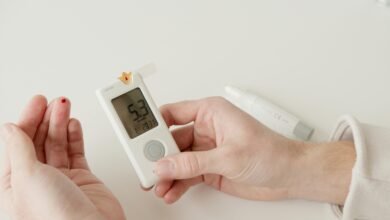Recognizing Early Signs of Diabetes
Recognizing Early Signs of Diabetes In today’s fast-paced world, chronic diseases like diabetes have become increasingly common. Recognizing early signs of diabetes can significantly improve outcomes and prevent severe complications. Early detection allows for lifestyle modifications and medical interventions before the disease progresses. This article explores the most common early symptoms, why they happen, and how to respond effectively.

What Is Diabetes?
Diabetes is a chronic health condition that affects how your body turns food into energy. The body either doesn’t produce enough insulin or can’t use it effectively. As a result, blood glucose levels rise, leading to various health issues. Understanding the types of diabetes helps in recognizing early signs of diabetes more accurately.
- Type 1 Diabetes: An autoimmune condition where the body attacks insulin-producing cells.
- Type 2 Diabetes: Develops when the body becomes resistant to insulin.
- Prediabetes: A warning stage where blood sugar is higher than normal but not high enough for a diabetes diagnosis.
Why Early Detection Matters
Recognizing early signs of diabetes can reduce the risk of severe complications such as heart disease, kidney failure, vision loss, and nerve damage. In many cases, symptoms are subtle and often ignored. Therefore, being aware of early warning signs is crucial for timely diagnosis and treatment.
Common Early Signs of Diabetes
Let’s dive into the early signs that should never be overlooked. Recognizing early signs of diabetes ensures you take control of your health before complications develop.
1. Frequent Urination
One of the most noticeable early signs is frequent urination, especially at night. The body tries to eliminate excess sugar through urine.
2. Increased Thirst
Due to frequent urination, the body becomes dehydrated, leading to constant thirst. This is a common symptom that most people tend to ignore.
3. Unexplained Weight Loss
If you’re losing weight without trying, it might be due to the body breaking down muscle and fat for energy. Recognizing early signs of diabetes includes monitoring weight changes.
4. Constant Fatigue
Feeling tired all the time, even after adequate rest, can be linked to poor glucose metabolism. This is one of the most overlooked early signs.

5. Blurred Vision
High blood sugar levels pull fluid from the eyes, causing vision issues. Recognizing early signs of diabetes includes noting any sudden vision changes.
6. Slow Healing of Wounds
If cuts and bruises are taking longer than usual to heal, it may indicate poor blood circulation caused by high blood sugar.
7. Tingling or Numbness
Tingling sensations in the hands or feet are signs of nerve damage, an early indicator of diabetes.
8. Increased Hunger
Even after eating, you might feel hungry again soon. This occurs when glucose doesn’t reach the cells to provide energy.
9. Skin Issues
Dark patches on the skin, especially around the neck or armpits, may be signs of insulin resistance, an early diabetes warning.
10. Mood Swings and Irritability
Fluctuating blood sugar can impact mental health, leading to mood changes. Recognizing early signs of diabetes involves monitoring emotional health as well.
Risk Factors to Watch
While symptoms are key, knowing the risk factors also helps in recognizing early signs of diabetes:
- Family history of diabetes
- Obesity or being overweight
- Sedentary lifestyle
- Poor diet (high in processed sugars)
- Age above 45
- History of gestational diabetes
If you fall into any of these categories, regular screening is crucial.

When to See a Doctor
Early signs should prompt immediate medical attention. A blood test can confirm whether you are diabetic, prediabetic, or in the clear. Recognizing early signs of diabetes allows for preventive measures rather than reactive treatment.
Diagnostic Tests to Confirm Diabetes
There are several tests used to detect diabetes:
- Fasting Blood Sugar Test: Measures blood glucose after 8 hours of fasting.
- A1C Test: Shows average blood sugar levels over the past 2-3 months.
- Oral Glucose Tolerance Test: Measures response to sugar intake.
- Random Blood Sugar Test: A quick test to assess current glucose levels.
Each test has its own significance. Recognizing early signs of diabetes and getting tested is the only way to be certain.
Lifestyle Changes After Early Signs Appear
Once early symptoms are noticed, lifestyle changes become essential. Recognizing early signs of diabetes should be a trigger to adopt healthier habits:
Diet Adjustments
- Focus on low glycemic index foods
- Reduce sugar and refined carbs
- Increase fiber intake
- Eat small, frequent meals
Physical Activity
- Aim for 30 minutes of exercise daily
- Include both cardio and strength training
- Even walking can significantly help
Weight Management
Losing even 5-10% of body weight can drastically reduce the risk. Recognizing early signs of diabetes early enough makes lifestyle interventions far more effective.

Stress Management
Chronic stress can spike blood sugar levels. Try techniques like yoga, meditation, and deep breathing.
Medical Management
For some, lifestyle changes might not be enough. In such cases, recognizing early signs of diabetes will lead to timely medical intervention.
- Metformin: Common for managing Type 2 diabetes
- Insulin Therapy: Often needed for Type 1 diabetes
- Monitoring Devices: Tools like glucometers and continuous glucose monitors (CGM)
Regular checkups ensure that early signs do not progress into full-blown complications.
Importance of Regular Screening
Even without symptoms, those with risk factors should undergo screening. Recognizing early signs of diabetes through routine tests can prevent future health crises. Annual screenings are recommended for people over 45 or younger individuals with risk factors.
Common Myths About Early Signs of Diabetes
Many people ignore early symptoms due to myths. Let’s debunk some:
- Myth: Only overweight people get diabetes
Truth: Thin individuals can also develop diabetes. - Myth: Children don’t get diabetes
Truth: Type 1 diabetes is common in children. - Myth: You’ll always have symptoms
Truth: Many early signs are mild or go unnoticed.
Recognizing early signs of diabetes is not about fear—it’s about empowerment.
Prevention Is Better Than Cure
Preventing diabetes is far easier than treating it. Recognizing early signs of diabetes gives you a head start. Here’s how to prevent it:
- Eat healthy
- Stay active
- Monitor blood sugar
- Maintain a healthy weight
- Avoid smoking and alcohol
- Get enough sleep

Final Thoughts
Recognizing early signs of diabetes is one of the most important steps toward taking control of your health. With increasing rates of diabetes worldwide, early awareness and timely action can make a life-changing difference. If you or someone you love is experiencing even one of these symptoms, don’t wait. Get tested and begin a healthy lifestyle today. You can also find the related topics on https://healthneno.com/



